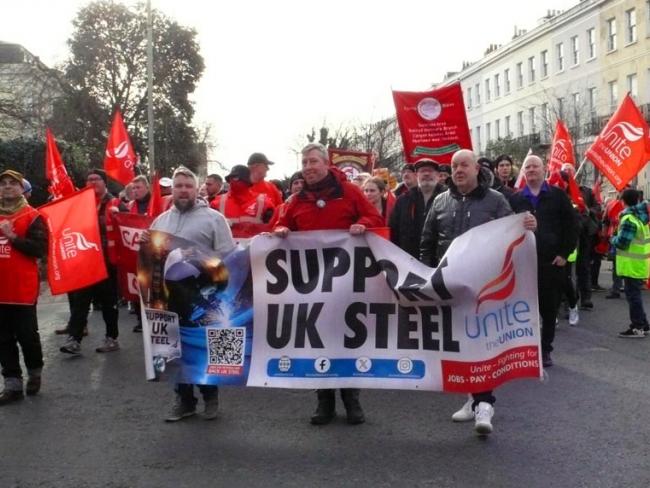
Steelworkers on the January 2024 TUC demonstration in Cheltenham. Now the government has had to act. Photo Workers.
Having failed to persuade the people that Britain can exist without industry, the government has been forced to make concessions. Even the sanctity of net zero is coming into question…
The recent announcement that the government is committing to invest £14.2 billion on a new double reactor power station at Sizewell in Suffolk is a welcome change of heart. After decades of procrastination, with most of our nuclear estate coming to the end of its natural life, the prospects for British industry were looking grave without abundant, readily available energy.
Some, like Sarah Darby, of Oxford’s Environmental Change Institute, consider the pressurised water reactor (PWR) favoured by French company EDF to be old technology, an outdated model. Very well, let them talk to the government and persuade them of this. Nonetheless, the fact that there is now a commitment to some kind of nuclear future is the real turning point.
At the same time, along comes an announcement that Rolls Royce will build a fleet of small modular reactors (SMR), which have the advantage that they can be factory made and delivered to where power will be needed, without the endless source of cooling water which PWRs require.
Tentative
Given the scale of our need, these are small, tentative steps, but they are on the right road.
This development has been forced on the government because it cannot persuade people to live the primitive life which the absence of manufacturing guarantees.
For decades, government attitude to industry has been characterised by distrust and neglect. Distrust, because when workers are engaged in their own industry, their own place of work here, they can exercise a level of control.
When distrust is combined with a policy of “let the markets provide”, the ensuing neglect of domestic industry in favour of importation represents nothing less than an assault on manufacture.
Had this neglect of industry been around at the time of World War Two, our capacity for self-defence would have been fatally undermined. To survive, Britain had to prioritise heavy industry, coal extraction and weapons production.
But the young male workers who would traditionally fill those roles were enlisting, so a proportion, initially 10 per cent, later more, were diverted from the front line to the coal face – the “Bevin Boys”. Young women filled the vacancies in the factories and on the land. Industry was our baseline of defence and had to be maintained at all costs.
The post-war period saw a drive to rebuild industry, including new technologies such as the nuclear power station at Calder Hall in 1956. Many industries were nationalised, with governments expected to accept responsibility for national interests. But it was a relatively brief period.
Privatised
In the 1970s, the defence industry was privatised – British Aerospace in 1977, British shipbuilding and the Royal Ordnance factories. Large private defence companies concentrated on arms sales abroad, effectively abdicating responsibility for the national interest.
From that time the attack escalated, with wholesale privatisation of public assets, and the destructive consequence of EU membership. Now, virtually every national asset of significance is either for sale or already sold. Ports, airports, power stations, railways, banks, steel, motor manufacture, utilities, even football teams, are foreign owned.
‘For decades, government attitude to industry has been characterised by distrust and neglect…’
But the British people are not going along quietly with this industrial destruction, particularly when it’s done in the name of decarbonisation. We know that the mined resources and manufactured goods we need are better mined and made here than imported from around the world.
Nothing shows up the absurdity of allowing the sell-off of industry more clearly than the recent debacle at British Steel in Scunthorpe, where the Chinese owner deliberately failed to invest in the works, hoping to oblige us to buy Chinese steel. And the government sourced coking coal (needed to make steel) from Australia, after blocking the proposed mine in Cumbria which could supply it.
The steel industry In Britain, a foundation industry on which everything else depends, is hanging by a thread. Depending on the market will not save it, and the government is forced, reluctantly, to step in. But it must do more than invest British taxpayers’ money in Australian mines.
Real wealth
This cannot be allowed to go on. Failure to invest in industry is failure to invest in genuine wealth creation, because industry, ultimately, alongside natural resources, is the source of all wealth.
Creation of wealth has been relegated for decades, replaced with a reliance on debt. Public sector debt has risen to £2.7 trillion, almost the size of the economy. To service this debt now will cost taxpayers £100 billion a year till the next election. This is unsustainable.
But amid the gloom there are some encouraging signs. Even the sanctity of net zero is coming under scrutiny. When motor manufacturers came to see that profits were being hit by imposed EV mandates, they began to apply pressure, either to be excused or for the time frame to be relaxed. And the government, under pressure, relented.
It may well be that Miliband’s ushering in a “New golden age of nuclear” is prompted by a growing realisation that renewables cannot drive industrial recovery on their own.
The markets are failing to answer our needs. Pressure must be maintained on the government to ensure that domestic manufacturing, particularly steel, powered by available, reliable and affordable electricity, is the cornerstone, not just of prosperity, but of national defence and security.
There has to be a growing call to scrap the net zero cant and ensure a future by using our natural resources to fuel an industrial regeneration, with British workers at the heart of it.
